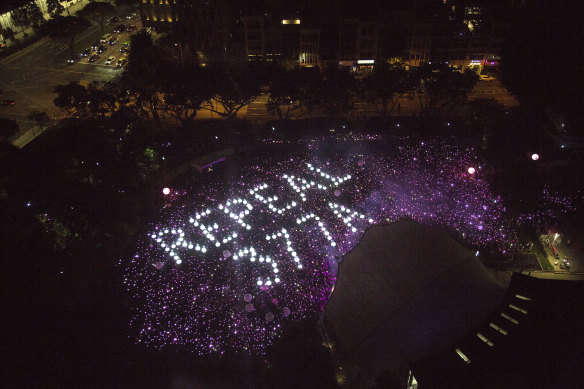[ad_1]
As a result, some activists in this island nation have questioned the announcement as representing any great progress at all.
Choong, who along with other campaigners had challenged S377A in the country’s highest court, is hopeful the government will not enshrine into the constitution the definition of marriage as being between a man and a woman.

Demonstrators form the characters Repeal 377A in a call to repeal Section 377A of Singapore’s Penal Code which criminalises sex between men during a Pink Dot event held in Hong Lim Park in 2019.Credit:Getty Images
On that, LGBTQI+ groups, whose annual Pink Dot rally drew a crowd of thousands when returned in June after pandemic lockdowns, are still awaiting information regarding the move to ban same-sex marriage.
For now, though, Choong is relieved at the prospect of a change he believes is long overdue.
“A lot of us in the community have been waiting for this,” he said. “We agree with the prime minister that this is the right thing to do.”
Authorities in Singapore have said repeatedly over the past 15 years that they would not actively enforce the law governing gay sex.

Messages of hope fill a board at a Pink Dot event in Singapore in 2019. Credit:Getty Images
Yet in a country in which many people take their social cues from the government, it has manifested itself in other ways.
“If the government says that something is not acceptable, it’s criminal, it builds in the mindset of Singaporeans,” said Choong, who is a trained counsellor. “[Consequently] they’re less open to having conversations about sexuality.
“There are families that because of the way the government looks at LGBTI children, they can’t have a conversation even within their family about it.
“And even though gay men might not be prosecuted in Singapore, a lot of them live in fear of their identity being exposed. Or if they do come out as a gay person, they fear that they might be subjected to a lot of discrimination.”
The pending repeal of the law is predictably not being celebrated in all quarters.
The Alliance of Pentecostal and Charismatic Churches of Singapore, which dubs itself a “caretaker of public morality”, has been rallying against it and is calling for a conscience vote in parliament, where Lee’s People’s Action Party holds 83 of the 104 seats, rather than one on party lines.
“The repeal is an extremely regrettable decision which will have a profound impact on the culture that our children and future generations of Singaporeans will live in,” said APCCS chairman Reverend Yang Tuck Yong.
As a result, the coalition of churches said, “we strongly urge the government to entrench the definition of marriage as a union between a man and a woman in the Singapore constitution”.

People of all ages join a Pink Dot rally in support of equal rights in Singapore in 2019.Credit:AP
That is a proposition that, unsurprisingly, disturbs gay-rights organisations, although they have described the decriminalisation of gay sex as “the first step on a long road towards full equality” and a “win for humanity”.
“Any move by the government to introduce further legislation or constitutional amendments that signal LGBTI people as unequal citizens is disappointing,” LGBTI groups said in a joint statement.
Loading
“We urge the government not to heed recent calls from religious conservatives to enshrine the definition of marriage into the constitution.”
– with AP

